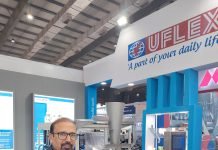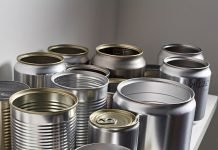
Organized by the Foundation for Innovative Packaging and Sustainability (FIPS) and supported by global specialty chemicals company Kuraray, the second edition of the National Conference on Innovative High Barrier Polymeric Material for Packaging of FMCG took place on 13 December 2023 at the India Habitat Center in New Delhi.
The four-hour event saw brand owners, polymer manufacturers and other personalities from the industry discuss the importance of sustainability, the challenges of flexible packaging, and Kuraray’s EVAL solution (brand name for EVOH — ethylene vinyl alcohol copolymer).
“Sustainability is a short word, let’s work on responsibility,” said NC Saha, founder chairman, FIPS in his welcome note. He highlighted the importance of sustainability in the industry, keeping in mind the need for proper high-barrier material for all kinds of packaging, be it for food or pharma. EVAL, he said, has a great oxygen barrier, which is important for food and pharma packaging.
“1mm of EVAL has the same gas barrier as a 10-meter thick wall of LDPE. With such performance, very thin layers of EVAL add valuable barrier function to efficient multilayer structures. This barrier function works in both directions, keeping harmful oxygen and contamination away from sensitive products while locking the aroma and value inside,” said Sripad A Amate, manager of EVAL sales, Kuraray India.
In subsequent discussions, Suneel Pandey, director, environment and waste management, TERI, Delhi, pointed to marine pollution, highlighting plastics as a major contributor. Acknowledging the role of plastic in packaging, he urged a shift toward more environment-friendly alternatives.
According to Pandey, the industry is recognizing the need to adopt sustainable practices. Recycling offers a practical approach to curb pollution as it promotes the circular economy by reusing materials and reducing the demand for virgin plastic, he said.
Mrinal Kanti Banerjee, director of FIPS, said 2-5% of EVOH in a structure is considered 100% recyclable, which is the differentiating factor of this material as a barrier.
Hiroshi Koyama, manager-technical, Kuraray, Japan, made a technical presentation on EVAL’s high gas barrier properties, aroma barrier properties, and its resistance to organic solvents, which protects food against the migration of contamination.
“EVAL is a clear and reliable alternative to aluminum foil. All-plastic EVAL barrier layers have excellent flex crack and pinhole resistance, even when flexed, folded, and shaken during processing and distribution,” said Koyama.
It’s a hydrophilic polar material with anti-static properties and a glossy appearance when used as an outside layer. In addition to packaging, its unusual mix of properties leads to its use as a technical plastic for industrial, electronic, and medical components.
Shuhei Kuzume, manager of Kuraray, Japan, in his presentation discussed the various types of EVAL.
EVAL M type: Lowest ethylene content available, and provides the highest barrier for automotive and flexible applications.
EVAL L type: Very low ethylene content and is suitable as an ultra-high barrier in flexible, bottle, and sheet applications.
EVAL F type: Offers superior barrier performance with long-term process stability, and is widely used as the standard grade for flexible, automotive, bottle, and tube applications.
EVAL C type: Can be used for high-speed co-extrusion coating and cast flexible applications.
EVAL H type: Combines high-barrier properties and long-term rum stability and thermoformability.
EVAL E type: Has a higher ethylene content that allows for greater flexibility and even easier processing
EVAL G type: Highest ethylene content, making it the best candidate among standard EVAL types for stretch and shrink film applications.
The event concluded with a panel discussion on barrier materials from the brand owners’ perspective. In the discussion moderated by Saha, Swati V. Gupta, senior manager, of packaging development at Amway Global, emphasized the protection of products and how packaging can comply with a product’s shelf-life till it reaches the customer in the preferred manner. Naveen Stuart of Reckitt Benckiser focussed on the reduction of the usage of plastic in packaging.









